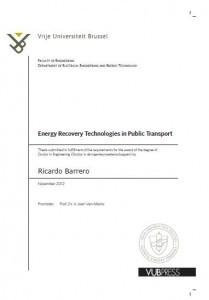
Transport sector, as one of the main energy consumers together with the industry and households, is looking into clean technologies that reduce its energy consumption and emissions. For this purpose, electric, hybrid (and plug-in hybrid) and fuel cell vehicles represent some of the technologies that using braking energy recovery systems can meet this goal. In urban areas, where population density is very high and emissions present a higher risk to human health, electric powered vehicles such as trams, metros and trolley buses have already been in use for many years. These vehicles do not produce local emissions and are already efficient due to their low friction (rail vehicles) and to regenerative braking technologies that allow energy exchange among vehicles. Nevertheless, the efficiency of this system can be improved with the inclusion of energy recovery systems that capture the vehicles braking energy that could not be re-used. In this context, this PhD proposes a novel multi-train simulation tool that models the interactions and energy exchange among vehicles running on the line and shows the influence of the traffic density on the vehicles energy regeneration and substations energy consumption. The tool can simulate both conventional and modern rail networks equipped with different energy saving technologies such as hybrid trains with on-board Rechargeable Energy Storage Systems (RESS), stationary RESS and reversible substations. The tool is validated with measurements taken in a conventional line and then, an assessment of on-board RESS, wayside RESS and reversible substation is done in a tram and metro line. Similarly, in order to study the potential reduction in energy consumption in urban buses, an enhanced backwards/forward looking simulation tool is presented. It can evaluate the benefits of Series Hybrid Electric Vehicles (SHEV) and compare different power flow control strategies in terms of energy savings and RESS requirements. The RESS of a vehicle or a railway will be formed by the energy storage device itself (e.g., batteries, Electric Double Layer Capacitors (EDLCs), flywheels, etc.) and a power converter that is able to control the power flow between the RESS and the system where it is installed. In an urban environment, where driving cycles experience frequent braking and low speeds, EDLCs are a good option to form the RESS due to their high efficiency, high power capability and long lifetime, among other characteristics. Therefore, this Ph.D. investigates a very particular power converter topology, the Series Resonant Converter, to act as an interface between the EDLCs and the vehicles DC bus (or the rail network supply line). The converter analysis and control is provided and a 30 kW prototype is designed built and tested. The efficiency, in function of the strategy used, is calculated theoretically and it is compared with experimental results.
Promotor: Prof. Dr. Joeri Van Mierlo
Committee members: Prof. Philippe Lataire (VUB), Prof. Alain Bouscayrol (University of Lille), Gerard Coquery (IFSTTAR), Prof. Patrick Guillaume (VUB), Prof. Rik Pintelon (VUB), Prof. Peter Van den Bossche (VUB/Erasmus Hogeschool Brussel)
